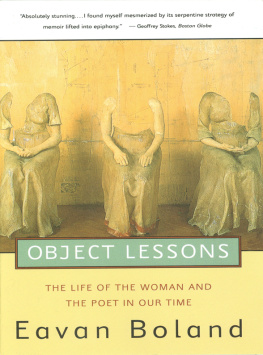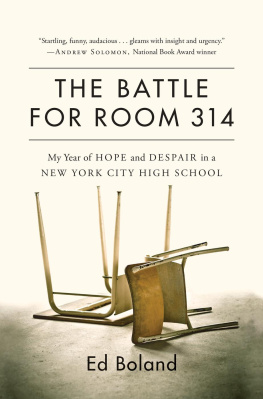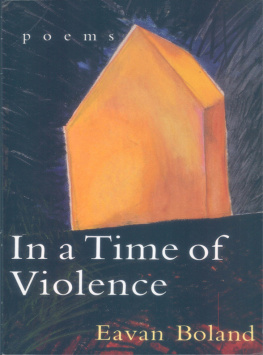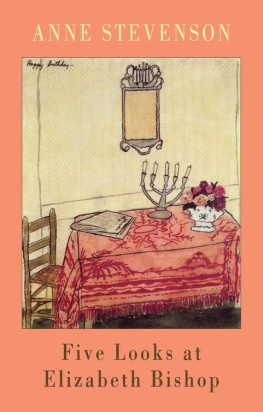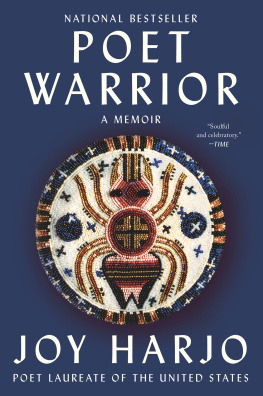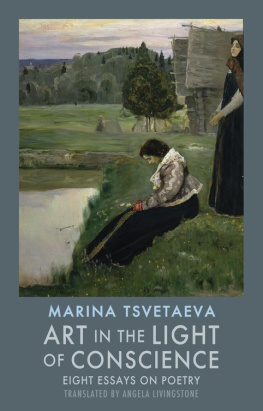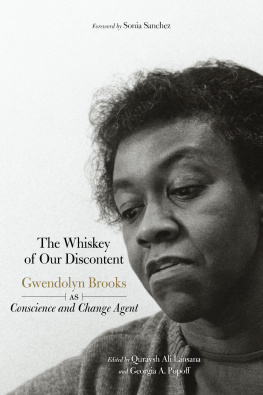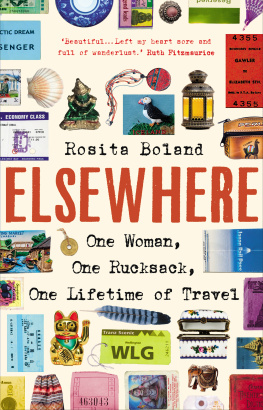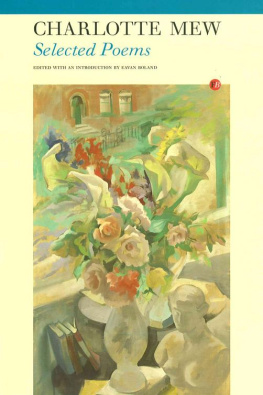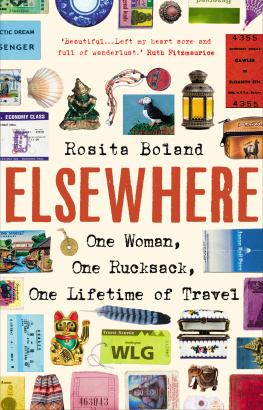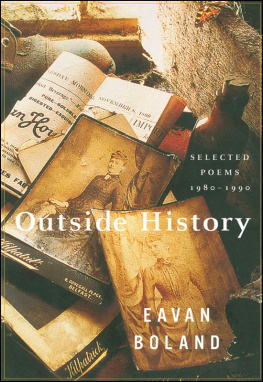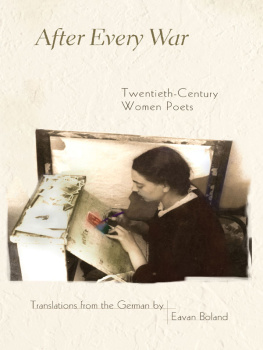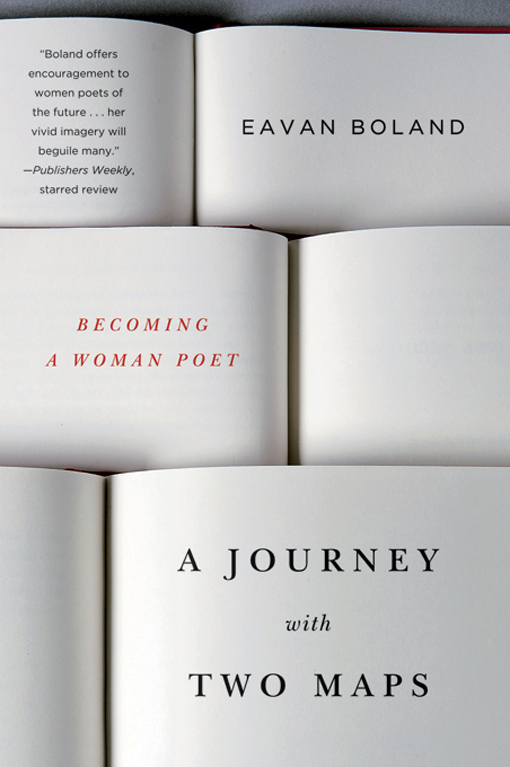
ALSO BY EAVAN BOLAND
New Territory
The War Horse
Night Feed
The Journey
Selected Poems: 1989
Outside History: Selected Poems, 19801990
In a Time of Violence
An Origin Like Water: Collected Poems, 19671987
The Lost Land
Object Lessons: The Life of the Woman and the Poet in Our Time
The Making of a Poem (edited with Mark Strand)
Against Love Poetry
Domestic Violence
The Making of a Sonnet (edited with Edward Hirsch)
New Collected Poems
Eavan Boland

A Journey
with
Two Maps
Becoming a Woman Poet

W. W. NORTON & COMPANY
NEW YORK LONDON
Copyright 2011 by Eavan Boland
All rights reserved
First published as Norton paperback 2012
Frhling 1946 1959 Elisabeth Langgsser, Claassen Verlag in der Ullstein Buchverlage GmbH, Berlin, reprinted courtesy of Ullstein Buchverlage GmbH. Excerpts from The Pattern and The Statue of the Virgin at Granard Speaks Paula Meehan, reprinted by permission of Wake Forest University Press. Excerpts from Another September Thomas Kinsella, Wake Forest University Press. Excerpts from Candelight, Nick and the Candlestick, and Night Dancers 1960, 1965, 1981 by the Estate of Sylvia Plath. Editorial material Ted Hughes, Reprinted by permission of HarperCollins Publishers. Excerpts from Renascence, Sonnet XLIII, First Fig, A Portrait by a Neighbor, Daphne, and Recuerdo 1917, 1922, 1923, 1945, 1950, 1951 by Edna St. Vincent Millay and Norma Millay Ellis, Reprinted with permission of Elizabeth Barnett, the Millay Society.
For information about permission to reproduce selections from this book,
write to Permissions, W. W. Norton & Company, Inc.,
500 Fifth Avenue, New York, NY 10110
For information about special discounts for bulk purchases, please contact
W. W. Norton Special Sales at specialsales@wwnorton.com or 800-233-4830
Book design by Brooke Koven
Production manager: Julia Druskin
Library of Congress Cataloging-in-Publication Data
Boland, Eavan.
A journey with two maps : becoming a woman poet / Eavan Boland. 1st ed.
p. cm.
Includes index.
ISBN 978-0-393-05214-5
1. Boland, EavanAuthorship. 2. PoetryAuthorship. I. Title.
PR6052.O35J68 2011
824 ' .914dc22
2010054023
ISBN 978-0-393-34232-1 pbk.
W. W. Norton & Company, Inc.
500 Fifth Avenue, New York, N.Y. 10110
www.wwnorton.com
W. W. Norton & Company Ltd.
Castle House, 75/76 Wells Street, London W1T 3QT
1234567890
For Jody Allen-Randolph
CONTENTS
ACKNOWLEDGMENTS
Being an Irish Poet: The Communal Art of Paula Meehan appeared in An Sionnach: A Special Issue on Paula Meehan , edited by Jody Allen Randolph.
The Case of Edna St. Vincent Millay appeared in Water~Stone Review .
Charlotte Mew: An Introduction appeared as the introduction to The Selected Poems of Charlotte Mew , edited by Eavan Boland (Carcanet Press, Manchester, England).
Domestic Violence appeared in the American Poetry Review and PN Review .
Domestic Violence and Translating the Underworld were published, respectively, under the titles My Blue Piano and Frhling 1946 in After Every War: Twentieth-Century Women Poets , edited by Eavan Boland (Princeton University Press).
Elizabeth Bishop: An Unromantic American first appeared in Parnassus: Poetry in Review .
A Latin Poet: A Lost Encounter appeared in a slightly different form in PN Review .
A Latin Poet: A Lost Encounter was published under the title Foebus Abierat in Poetry magazine.
Letter to a Young Woman Poet appeared in The American Poetry Review and in Feminist Literary Theory and Criticism: A Norton Reader , edited by Sandra Gilbert and Susan Gubar (W. W. Norton & Company).
Looking Back and Finding Anne Bradstreet appeared in Green Thoughts, Green Shades: Essays by Contemporary Poets on the Early Modern Lyric , edited by Jonathan Post (University of California Press), and in Seventeenth-Century British Poetry, 16031660 (Norton Critical Edition), edited by John P. Rumrich and Gregory Chaplin (W. W. Norton & Company).
The Other Sylvia Plath appeared in The Grand Permission: New Writings on Poetics and Motherhood , edited by Brenda Hillman and Patricia Dienstfrey (Wesleyan University Press).
Translating the Underworld appeared in Northwest Review .
THANKS TO THE editors of the journals and anthologies in which these essays appeared. Thanks to Kevin Casey, Jill Bialosky and Michael Schmidt. Special thanks to my friends and colleagues at Stanford University.
PREFACE
THIS IS A BOOK OF being and becoming. It is about being a poet. It is also about the long process of becoming one. If these seem in the wrong order there is a reason: the disorder is part of my subject. There is nothing settled about a poets identity. The becoming doesnt stop because the being has been achieved. They proceed together, attached in ways that are hard to be exact about. For that reason, this is not a scholarly book. I did not approach my subject by finding facts. I approached it by finding myself.
Ask yourself in the most silent hour of your night: must I write? said Rilke. Such clarity is hard to come by when youre young. Poetry seemed a magisterial entity back thennot by any means open to a question asked in the silent dark. To start a poem on an ordinary Dublin afternoon was anything but simple. I didnt know how to weigh ideas about poetry. Nothing in the life I lived as a studentand later as wife and mother at the suburban edge of Dublinsuggested I had the wherewithal to do so.
But I did have a unit of measurement. It was the measure of my own life. It was there in the awkward and fanciful assembly of myself as a woman poet in the powerful, resistant literary culture I inherited. Looking back, it seems even now an impossible enterprise: like an early aviator in a remote place, hiding the bulky wings and small wheels in a garage or back garden to protect the odd, presumptuous dream of flight. I was the aviator. I assembled the dream slowly, over years. It was this which gave me some way of understanding my subject; and made this book.
Poetry begins where language starts: in the shadows and accidents of one persons life. And yet many traditional accounts of the making of a poet are over and done with before the reader gets there. Even though I admired those texts when I was young, I regretted they didnt wait for me. The growth of a poets mind was written aboutoften with extraordinary powerat its finishing point rather than its source.
I locate those beginnings at an earlier stage here. I push the process back to an origin some may think too personal. But I wanted to write that record, for the very reason that it has often been unwritten. To do that I knew I needed an alternative critique, one that blended autobiography and analysis. Both seemed necessary. It seemed right that the intimacy and dailyness of experience not be separated from the rigors of criticism, if only because they co-exist in the life of a working poet. They certainly co-existed in mine.
How shall we tell each other of the poet? wrote Muriel Rukeyser. In the spirit of that question, the second part of this book is about women poets Ive admired and learned from. When I was young some of them were unknown to me, even by name: nothing in my education had pointed me towards them. Because of that, a part of my formation happened without the light and example of some of these poems. And so it may be that the real editors of this book are passion and regret.
Next page

